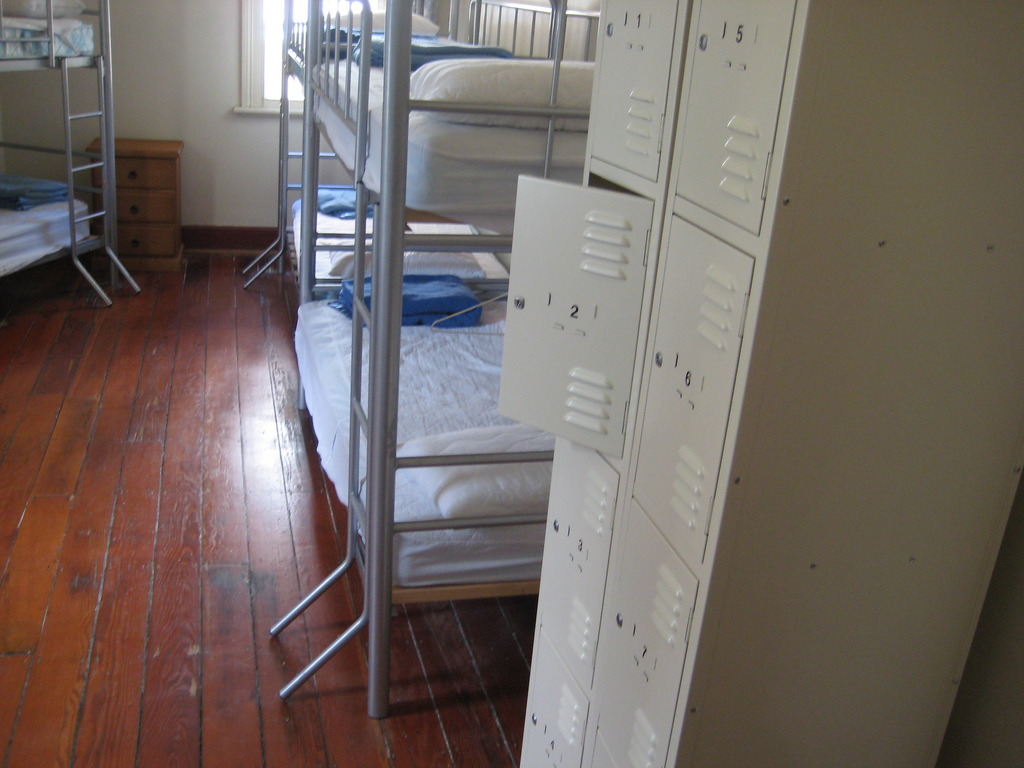Sponsored Listings:
By Becky Mahan, Editor
1. Pack accordingly (and smartly)
Remember that you’re not staying in a five-star hotel with room service and complimentary amenities. Bring your own soap, towel, and handy carrying case for lugging all your toiletries down the hall. Flip-flops are also strongly recommended – you don’t want to know what’s growing on a communal bathroom floor, no matter how clean the hostel is otherwise. Ear plugs are a must when sharing a room with other people, unless you’re the kind of person who can sleep through a hurricane. And a flashlight is ideal, so you’re not THAT person who needs to get up for a 5am flight and turns on the bright, fluorescent overhead lighting, waking everyone up.
2. You don’t HAVE to share a bedroom (or a bathroom)
Private rooms are commonly available, but keep in mind that if it’s a double room orientation (meaning, the hostel wants to fit 2 people in there), you’ll have to pay for both “people” if you want to book it alone. Couples traveling together are much better off booking a private room without absorbing too much extra cost. Also, private rooms don’t always have private bathrooms – if they do you’ll likely pay a nominally higher rate for that added luxury.
3. Join the community events
Most hostels offer community events in-house like trivia nights or other fun communal activities; joining these is a great way to get acquainted with your hostelmates. They can also host off-site events like guided city walks or bar crawls. Just inquire at reception.
4. There’s little cause for alarm regarding safety and security

Theft in hostels is not nearly at the level fear-mongers want you to believe. Rooms come with locks, and there’s typically some form of locker/storage facility – whether in the room or in a communal room near reception. Still, bring your own TSA lock just in case – and if you’re really paranoid, pack your most essential items into your day pack and use it as a pillow. Also, for girls traveling alone (or who are uncomfortable staying in the same room as guys), there’s usually a female-only dorm option.
5. Use the staff as a resource
Hostel staff are generally locals, or expats who know and love the city – hence why they stayed! Use them as resources and city guides. They know where the grocery stores are, the best bars and restaurants, the unsafe neighborhoods, and other important tidbits about the area.
6. It’s a social atmosphere – don’t be a hermit!
You’ll have a much better time if you practice breaking the ice and getting comfortable with introducing yourself to your hostel-mates (and roommates.) Hostels are communal, social places, and while some are better at this than others, you have a better chance of enjoying your stay if you can chat or go out with others than if you stay a hermit.
7. Breakfast might not be great

You’re probably stoked that your hostel includes free breakfast – score, right?! Well, sorry to burst your bubble, but it often consists of corn flakes, juice, and toast. Although, hey, any free food is good food, right? Sometimes you’ll get lucky and get hot eggs or meat and cheese, but it’s typically very bare-bones. Just be prepared (and know the hours breakfast is served, so you don’t miss out!), and get your fill of what you can. Then ask if there are any perks or discounts at nearby eateries for hostel guests. They should tell you this at check-in, but sometimes that isn’t totally thorough if there’s a big group at once.
8. Courtesy is key
Do your dishes and clean up after yourself in the kitchen. Don’t spread your things all over the bedroom; stick to your bunk/bed. And for the love of backpackers everywhere, be QUIET if you have an early flight or come in late after a night of partying. Basically, don’t be a jerk.
9. Check out membership options
There are some membership cards that will give you discounts not only at that chain of hostels, but also on attractions, local transportation, and sometimes even airfare. One of the most common is the Hostelling International (HI) card, valid at all YHA hostels worldwide. In countries where hostels are a mass market, you can often find a specific card: for example, New Zealand offers the Budget Backpacker Hostel (BBH) cards – similar to the HI card, but valid only in New Zealand.
10. Do your research

All other things to consider will be provided on the booking site. Research a hostel and read the reviews to take into account what others think of it – like how quiet it is (some hostels are just known for having major party atmospheres, while others are ideal for more quiet, low-key guests), where it’s located, what amenities are included, what they provide for you free of charge (or for an added cost), etc. Decide what kind of experience you want, and pit that against the hostel’s reputation to find the best option for yourself.
Source: gogobot.com










